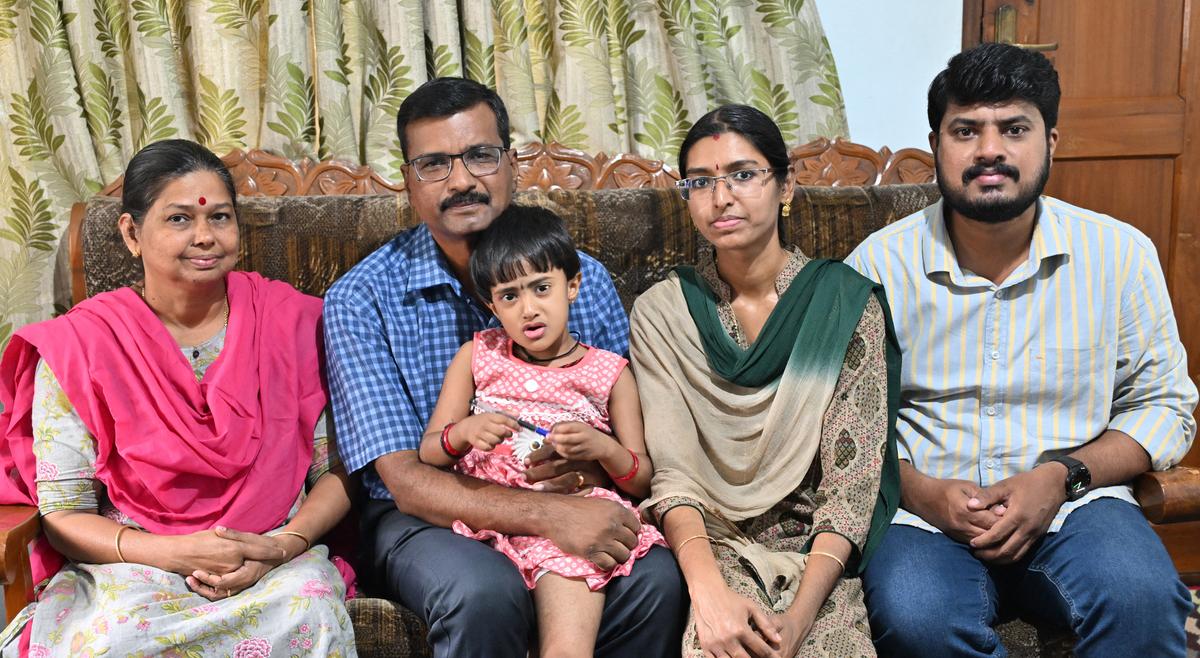
Every Sunday, students from across the country, also a couple of them from Nigeria, eagerly await a WhatsApp alert. Like clockwork, the message pings at 11am, and a virtual classroom transports them to the backwaters of Kerala as E C Sabu, an award-winning teacher introduces them to Malayalam words like valleyvanchipaatu, and kaayal. As the third batch of Amrutham Malayalam, a seven-month online Malayalam course offered by the World Malayalee Council, Coimbatore Province begins, Sabu says, “Our students are a mixed group of professors, doctors, retirees, school children, and teachers who speak Marathi, Telugu, Kannada, Urdu or any language. It’s a big thrill for them to read name boards in Malayalam while travelling in Kerala.”
An award-winning teacher, Sabu served as vice-principal, later as principal of CMS Higher Secondary School before retiring from active teaching this May. “I wanted to be a journalist but ended up becoming a Malayalam PG Assistant in 1990 at CMS School. My first batch of class XII students are over 52 years old now,” he says as he reflects upon his 35-year journey in teaching.

Around the same time, he also became a part of Coimbatore Malayalee Samajam’s seven-month certificate course that opened its doors to learning Malayalam for non-native speakers. “The course is on its way to set a record as the longest running course in any regional language. Kerala’s State Resource Centre (under the Ministry of Human Resources Development, Government of India) was our sponsor for three decades. Now, with World Malayalee Council’s online course for the last three years, the reach has been immense.”

A file photo of coimbatore district Dr GS Sameran Handing over pandita sresta award to ec sresta award for his service in the education sector in 2021 | Photo credit: special arrangement
In the 1990s, Tamil speakers enrolled in large numbers, especially students of MA Tamil in Bharathiar University, he recalls. Poet Sirpi Balasubramaniam who headed the Tamil department made it mandatory for students to clear a paper in Malayalam. “Once, 14 Tamil PhD students from the University joined the course and scored cent percent marks in Malayalam exams at the end of the course. They are all now HoDs of Tamil in various colleges, like Dr Uma Maheswari at Government College in Chittoor, Kerala and others at Government College, Ooty and Maharaja College, Erode,” he reminisces, adding that the course is a melting pot of cultures giving rise to new friendships.
Sabu’s teaching method begins with easy letters before moving on to forms, sentences, grammar, translation, and spoken language. Every year, a number of non-native speakers attend to understand Kerala’s art and culture, its landscape, people and literature. Over the last three decades, the certificate course evolved as a literary movement. One of the students translated celebrated Malayalam writer VAKOM MOHAMMED BASHEER ‘s works in Tamil. Another PhD student who joined the course while doing her study on comparative literature on the works of Tamil writer Nanjil Nadan and Malayalam writer CV Balakrishnan turned author with a translation of Malayalam short stories.

Sabu who has received a number of awards — Ezhuthani Award, Panditha Sresta Award and Krishna Mangad Cherukatha Award (for his short story) — cant’s stop talking about his students.
“The hard work and dedication of my students keeps me going. In the current batch, we have Dorothy, a Bengali who has beautifully picked up the nuances and speaks impeccable Malayalam now. Cardiologist Dr Matheswaran has started conversing with his patients from Kerala. Some join the course because their neighbours are from Kerala or if they are employed in firms run by Malayalees. Then, there are polyglots who join for the sheer love of languages. One of the students Dr Viswaroop is a native Telugu speaker, but also knows Kannada, Tamil and now Malayalam.”

Award-winning Malayalam teacher E C Sabu says his family support helped him achieve his teaching feat
| Photo Credit:
Siva Saravanan S
While teaching, his social outings come to a standstill. “I have to thank my wife, K Chitra, a retired Hindi professor, my daughter S Lakshmipriya, my son-in-law J Murali Krishnan, my grand daughter Parvathi Krishna for being supportive. I feel charged when I am with my students. They understand what keeps me motivated,” he says adding that his high schooling at NSS High School at Pala in Kerala drew him closer to the language. “Especially my Malayalam teachers like Raghavan Nair and Velu Pillai who introduced me to the nuances. It was a turning point in my journey. Later in college, the first batch of Mahatma Gandhi University in Kottayam, our vice-chancellor waS Ur AnanthamurthyGnanapith award winner.”
Teaching Malayalam to a mixed group has become a part of his life, says Sabu. “Learning a new language is not just about letters. It’s an introduction to culture, geography, lifestyle. We highlight all these in the classes to make it engaging and alive. Based on my experience, I know the challenges faced by students in learning a new language, so my methodology takes into account these aspects. While joining the course, the question on everyone’s mind is ‘Is it possible to master a language in seven months?’ But once I see the progress, I feel overjoyed.”
As for his future plans, he wants to move back to his hometown Pala in Kerala and start farming. “I have built a house there and we have already planted jackfruitmango, and pepper. But, the online classes will continue without any break,” he says, adding, “There is no full stop to learning.”
To know more on the upcoming batches of online Malayalam classes, call 9486477891/ 6380701846
Published – July 05, 2025 08:16 PM is








